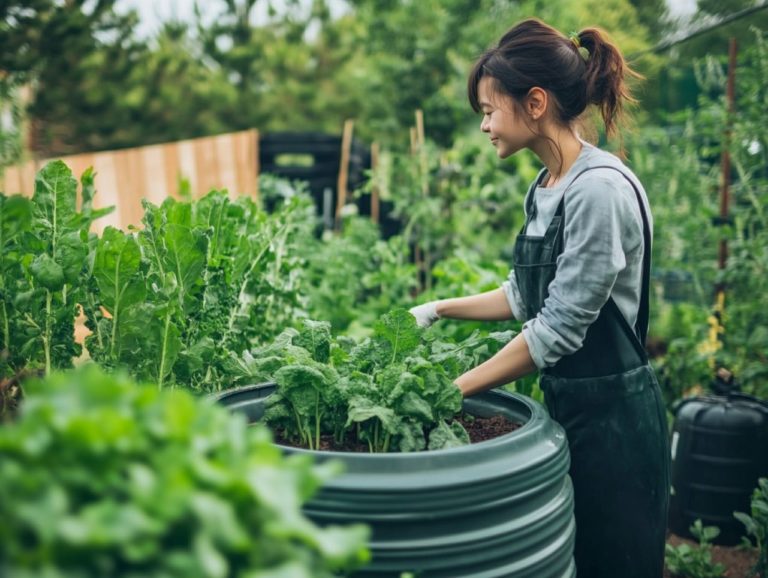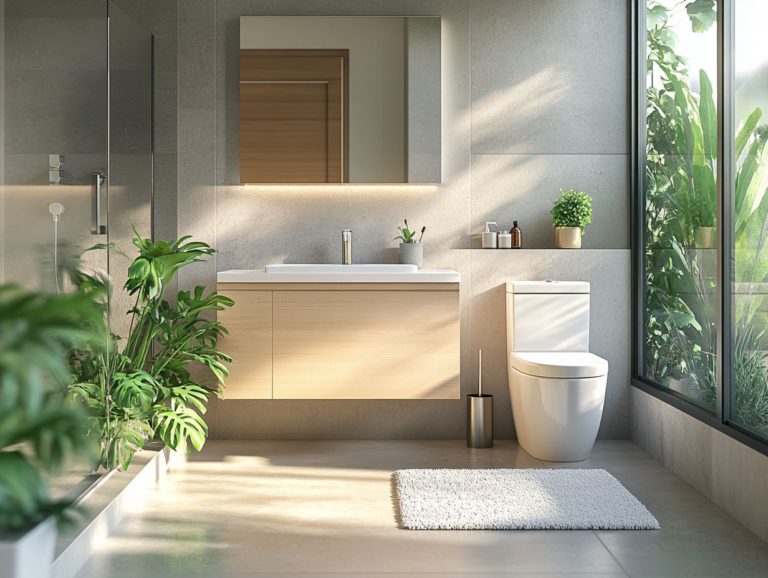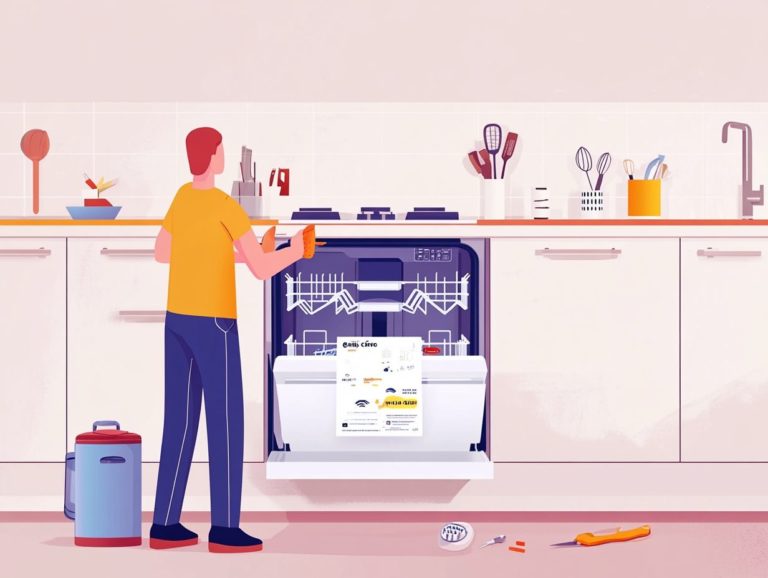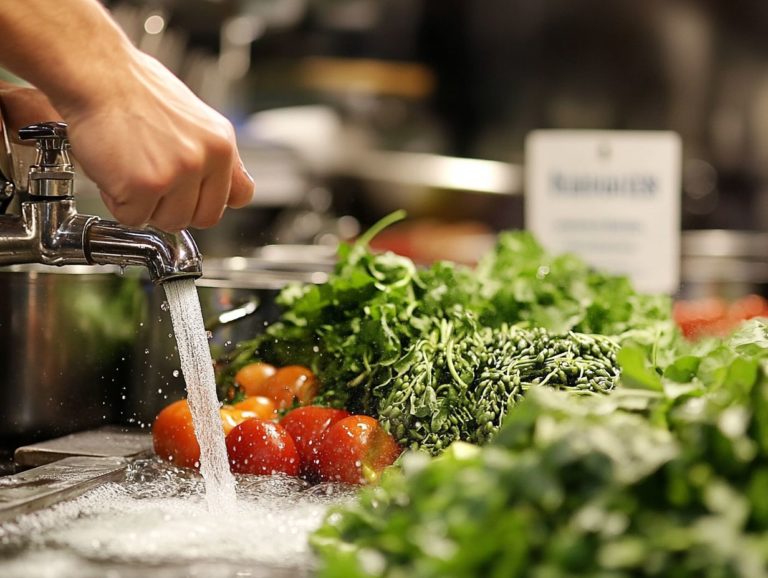How to Calculate Your Home’s Water Usage
Understanding your home’s water use is essential. It helps you save money and conserve resources.
This guide will help you calculate your water needs for both indoor and outdoor activities.
You ll find practical tips to reduce waste and tools to monitor your usage easily.
Let s explore simple ways to enhance your water efficiency at home and make the most of this valuable resource.
Contents
- Key Takeaways:
- Why Calculate Your Home’s Water Usage?
- Determining Your Water Usage
- Factors Affecting Water Usage
- Reducing Your Water Usage
- Tracking Your Water Usage
- Preguntas Frecuentes
- Sab as que calcular el uso de agua es clave para ahorrar dinero y conservar este recurso vital?
- C mo calculo el uso de agua en mi hogar?
- Qu factores pueden afectar el uso de agua en mi hogar?
- C mo puedo reducir el uso de agua en mi hogar?
- Existen herramientas o calculadoras en l nea disponibles para ayudarme a calcular el uso de agua en mi hogar?
- Qu debo hacer si noto un aumento repentino en el uso de agua en mi hogar?
Key Takeaways:
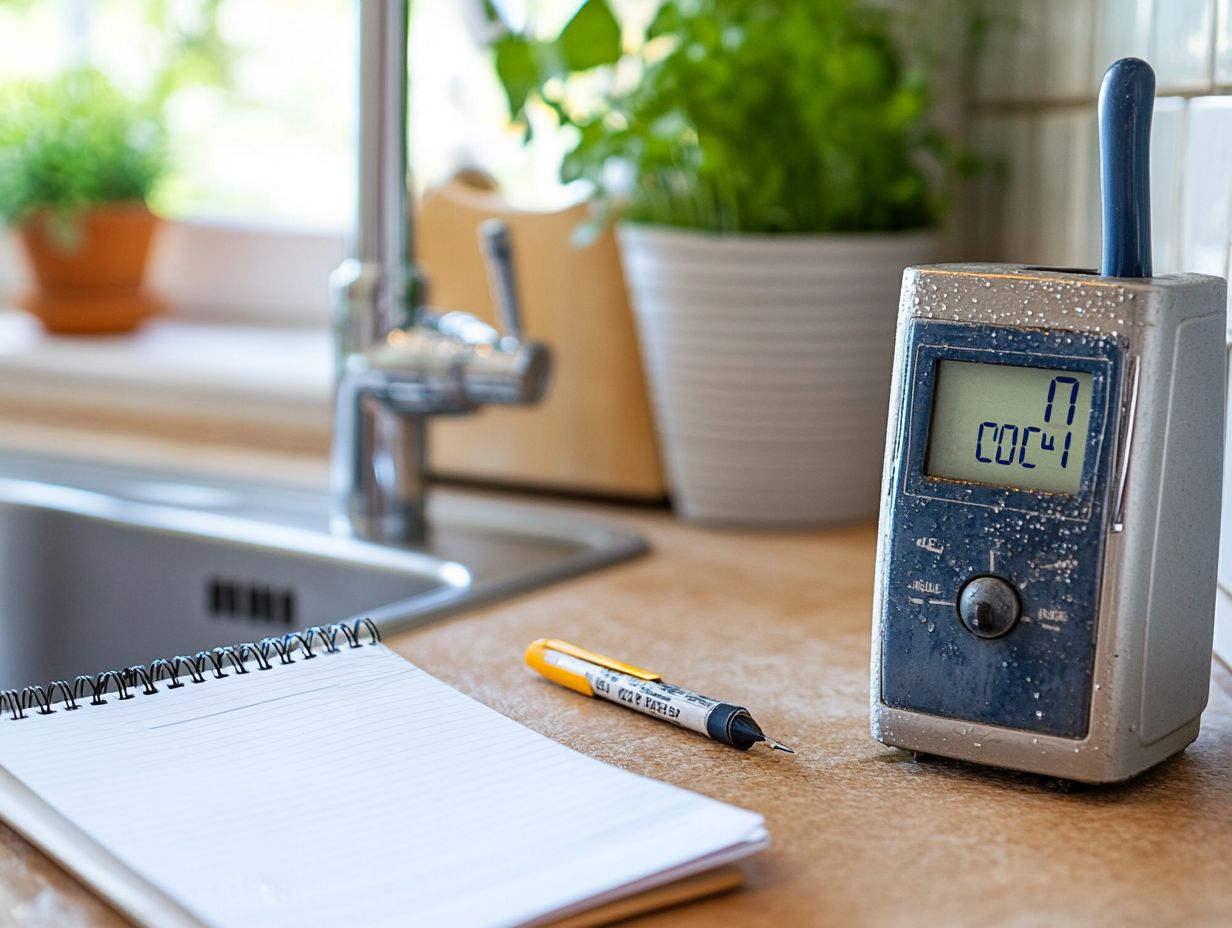
- Monitoring your home’s water use is important for both environmental and financial reasons.
- Calculating your indoor and outdoor water use helps identify areas for conservation.
- Factors like climate, household size, and inefficient devices greatly impact your consumption.
- Implementing conservation tips and tracking usage can help reduce overall water consumption.
Why Calculate Your Home’s Water Usage?
Understanding your home’s water use empowers you to save more and act responsibly. This is especially important in areas facing drought or climate variability.
Calculating your daily water needs enables you to plan your consumption effectively, ensuring your fixtures work at peak efficiency.
This awareness fosters water conservation and helps estimate the water footprint of everyday activities, from cooking and cleaning to irrigating gardens and farms.
By monitoring your water use, you can pinpoint areas for improvement and cultivate sustainable practices that benefit both the environment and your wallet.
Importance of Monitoring Water Consumption
Monitoring water use in your home reveals valuable insights into your daily consumption and highlights opportunities for conservation.
By observing your usage patterns, you can identify areas where small adjustments lead to significant savings on your water bills while enhancing your commitment to sustainability.
Devices like dishwashers and washing machines greatly influence your overall consumption. Regularly assessing their efficiency ensures they function at their best, reducing waste.
Understanding seasonal fluctuations in water demand helps you plan effectively for drought periods, ensuring every drop is utilized wisely.
Ultimately, embracing these practices lowers your expenses and positively impacts the environment.
Determining Your Water Usage
Determining your water use requires a thoughtful calculation of both indoor and outdoor consumption, which is essential for measuring your home’s water efficiency and providing a complete understanding of your household’s needs.
Indoor use includes daily activities like cooking, cleaning, and personal hygiene, while outdoor use often encompasses irrigation for gardens or lawns.
By understanding the speed at which water comes out of taps and devices, you can manage your water storage and usage effectively. This assessment reveals peak demand periods and uncovers conservation opportunities.
Calculating Indoor Water Usage
Calculating your indoor water use is crucial for understanding how much water you consume in daily activities, especially in the bathroom and kitchen. For more insights, check out this guide on how to monitor your water usage effectively; these areas contribute significantly to typical household consumption.
To curb water waste, consider these strategies:
- Install low-flow fixtures.
- Fix leaks promptly.
- Be mindful of your habits, like taking shorter showers.
- Run dishwashers only with full loads.
Simple changes like these can lead to substantial savings, highlighting the impact of informed choices in your daily life.
Start monitoring your water usage today to save money and protect our planet!
Estimating Outdoor Water Usage
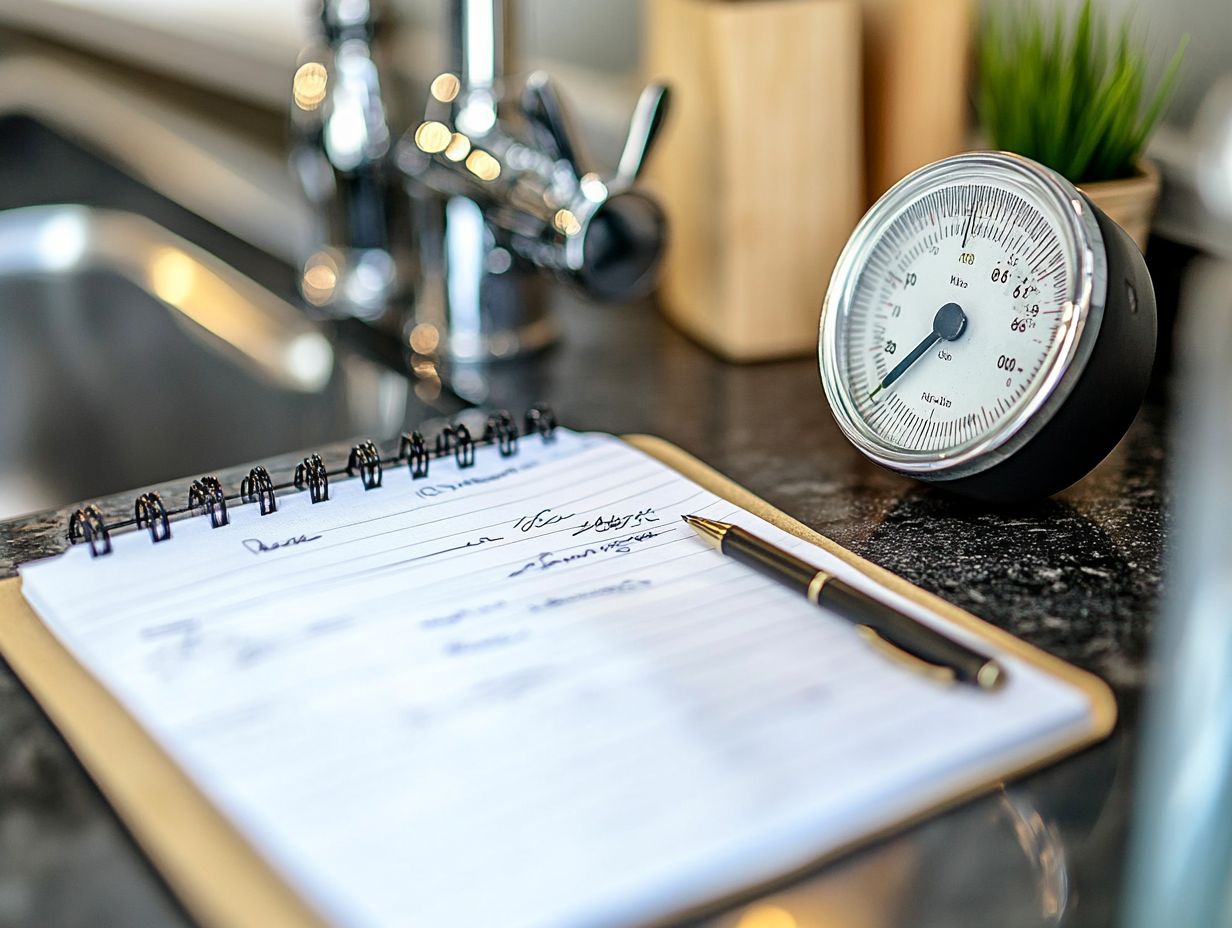
Estimating your outdoor water usage is essential. This is especially important if you re involved in gardening, lawn maintenance, or farm irrigation. Such activities can significantly impact your overall consumption.
Calculate the water needed for irrigation to manage your resources effectively. Start by measuring your garden area to determine the necessary water per square foot. Consider the types of plants you have and the soil conditions.
Invest in advanced irrigation systems, like drip irrigation a system that delivers water slowly to plants’ roots or soaker hoses, which minimize waste. You can also plant drought-resistant plants to drastically reduce your outdoor water needs.
Consider creating a rainwater harvesting system to collect and store runoff. This provides an eco-friendly irrigation option. Be mindful of peak demand periods, especially during the summer months, to optimize water usage and ease the strain on local supplies.
Factors Affecting Water Usage
Numerous factors shape water usage in households, such as:
- Climate
- Household size
- Efficiency of appliances
Understanding these factors can save you money! These elements can vary dramatically across different regions, influencing how much water is consumed in each home.
Climate and Household Size
The climate of your region plays a crucial role in shaping water usage. Household size also directly influences daily water needs.
For instance, if you live in an area with notable seasonal changes, you may notice spikes in water consumption during warmer months when your garden thrives and outdoor activities increase. Conversely, if your region experiences prolonged drought conditions, you ll need to implement careful water management practices to sustain your family and the surrounding ecosystems.
Larger households naturally face greater demands. Daily routines often involve multiple showers, laundry loads, and dishwashing cycles. To tackle this challenge, consider:
- Using water-saving appliances
- Scheduling routine maintenance to minimize leaks
- Encouraging mindful consumption habits among household members
By doing so, you can ensure your household thrives even in the face of environmental constraints. How does your household stack up against these challenges?
Leaks and Inefficient Appliances
Leaks and inefficient appliances are often sneaky culprits behind excessive water usage. They result in higher bills and the unnecessary waste of valuable resources.
Leaks can hide behind walls or be buried underground, going unnoticed until they ve caused significant damage. They quietly drain your water supply and steadily increase your costs over time.
Outdated appliances, like older washing machines and dishwashers, tend to guzzle more water than their modern counterparts. By choosing water-efficient models equipped with advanced technology, such as sensors and optimized water levels, you can significantly boost your conservation efforts.
Address leaks now to stop wasting water! Upgrading not only reduces waste but also leads to noticeable savings on your utility bills. This highlights the dual benefits of being environmentally conscious while financially savvy.
Reducing Your Water Usage
Reducing your water usage benefits both the environment and your utility bills. It promotes sustainable living practices.
Embracing mindful consumption leads to a more responsible way of life, aligning your daily habits with a commitment to sustainability. Cut your bills while saving the planet!
Make the switch to mindful consumption today!
Tips for Conserving Water
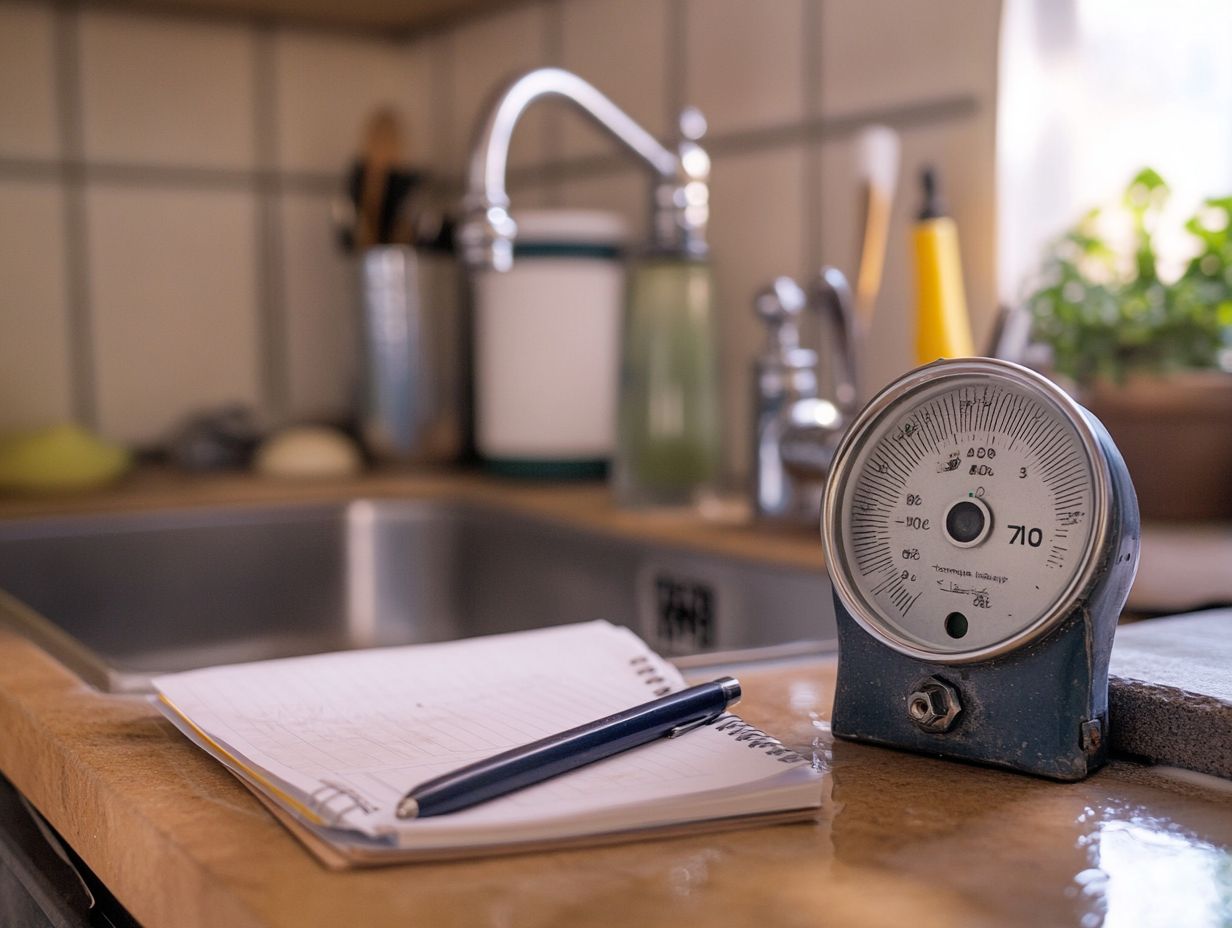
Conserving water can be achieved through simple yet effective tips that seamlessly blend into your daily routine. These practices enhance your overall efficiency.
For example, fix leaks in your faucets and pipes! You ll save gallons of water each day and avoid those pesky, costly water bills.
Use low-flow fixtures in your bathrooms and kitchens. They save water without sacrificing performance.
Adjust your irrigation schedules to align with weather patterns. This ensures your gardens receive just the right amount of water, minimizing waste.
Each of these practices plays a crucial role in promoting water efficiency and sustainability. Together, they create a ripple effect to preserve this invaluable resource for generations to come.
Tracking Your Water Usage
Track your water usage effectively with these tools and techniques. They enable precise monitoring of consumption across different fixtures and activities.
This dual approach helps you understand your water habits better, allowing for informed decisions that lead to significant savings and sustainability.
Tools and Methods for Monitoring Usage
A variety of tools and methods are available for monitoring water usage. They help you uncover inefficiencies and track your consumption patterns with ease.
Advanced water meters are gaining traction. These devices provide real-time tracking and insights into your daily water consumption. Plus, mobile apps geared towards water management offer personalized recommendations to reduce waste, often integrating effortlessly with these meters.
Some homeowners also utilize online calculators that analyze historical usage data, allowing them to spot trends over time and adjust their habits accordingly.
By leveraging these tools, you gain a clearer understanding of your consumption habits. Empower yourself to make informed decisions that foster water efficiency and conservation.
Preguntas Frecuentes
Sab as que calcular el uso de agua es clave para ahorrar dinero y conservar este recurso vital?
El uso de agua se refiere a la cantidad utilizada en un per odo espec fico. Calcularlo en su hogar le permite monitorear su consumo e identificar posibles desperdicios, lo que le ayuda a conservar agua y ahorrar dinero en las facturas de servicios p blicos.
C mo calculo el uso de agua en mi hogar?
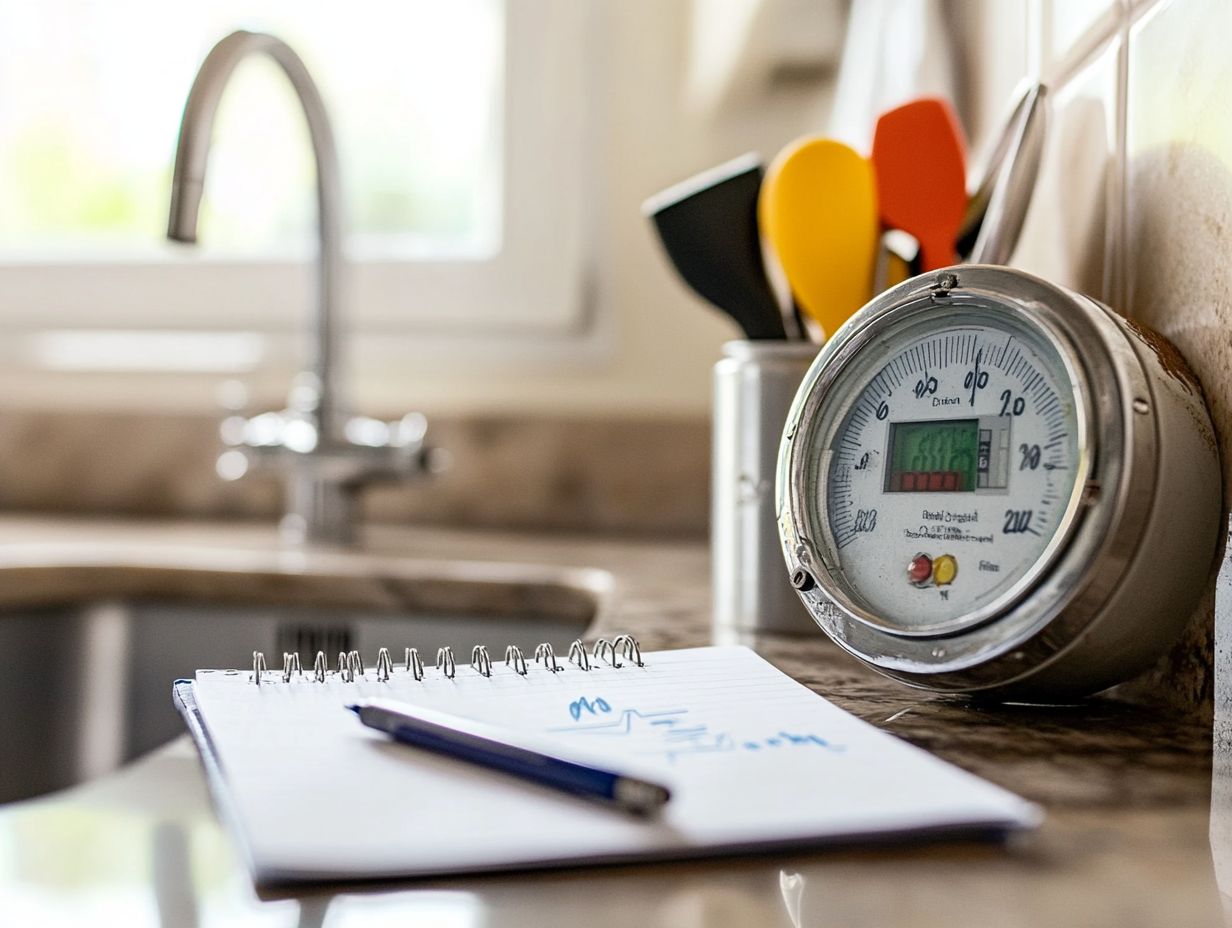
Para calcular el uso de agua, re na sus facturas de agua de los ltimos 12 meses. Sume el uso total de cada mes y div dalo por 12 para determinar su uso mensual promedio. Tambi n puede usar un medidor de agua para rastrear su uso diario y calcular el total al final del mes.
Qu factores pueden afectar el uso de agua en mi hogar?
Varios factores pueden influir en el uso de agua en su hogar, incluyendo el n mero de personas que viven ah , el tama o de su hogar, el tipo de electrodom sticos y grifos, as como sus h bitos y rutinas diarias. El uso de agua al aire libre, como el riego o el llenado de piscinas, tambi n puede impactar significativamente su consumo total.
C mo puedo reducir el uso de agua en mi hogar?
Hay muchas maneras de reducir el uso de agua, como reparar fugas, usar electrodom sticos y grifos que ahorran agua, tomar duchas m s cortas y cerrar el grifo mientras se cepilla los dientes o se afeita. Tambi n es til educar a los miembros de su familia sobre la importancia de la conservaci n del agua y alentarlos a adoptar h bitos que ahorren agua.
Existen herramientas o calculadoras en l nea disponibles para ayudarme a calcular el uso de agua en mi hogar?
S , hay muchas herramientas y calculadoras en l nea que pueden ayudarle a estimar el uso de agua en su hogar, basado en el tama o de su hogar, el n mero de electrodom sticos y sus h bitos diarios. Algunas compa as de servicios de agua tambi n ofrecen calculadoras de uso de agua gratuitas en sus sitios web.
Qu debo hacer si noto un aumento repentino en el uso de agua en mi hogar?
Si nota un aumento significativo en el uso de agua en su hogar, debe actuar de inmediato y verificar si hay p rdidas de agua o electrodom sticos que no funcionen correctamente.
Contacte a su compa a de servicios de agua para que realicen una revisi n del consumo de agua. Cuide su hogar y sus recursos!

